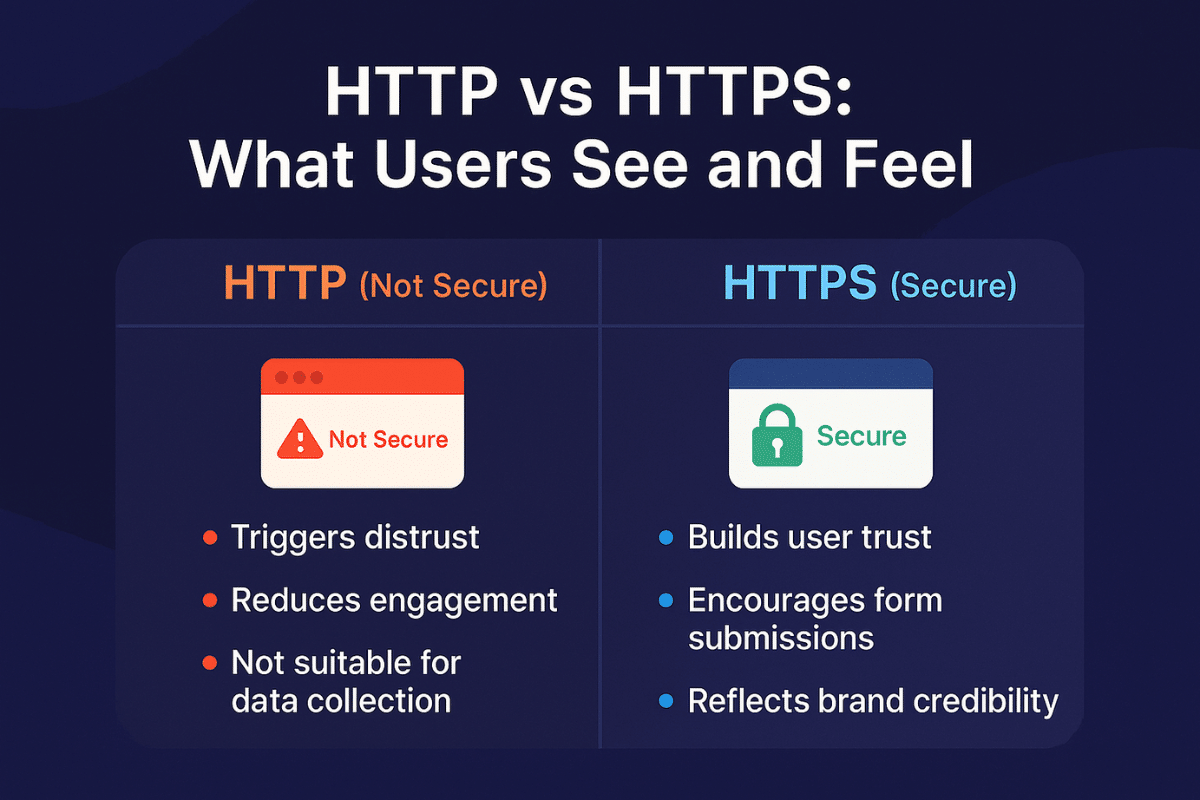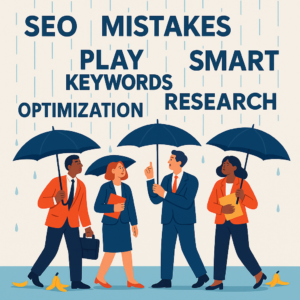The HTTP vs. HTTPS debate has been ongoing, with the stakes being higher than most web owners realize. This is more than just a technical tick on your SEO checklist. It is a core part of your website’s reputation, safety, and most importantly, your users’ trust, and therefore your SEO ranking.
So does changing from HTTP to HTTPS affect your SEO? Yes, and it does so in more ways than most people think. It affects user behavior and how safe your website is in the future.
What’s the Difference Between HTTP and HTTPS?
Before we get into the SEO side of things, we first need to understand the difference between HTTP and HTTPS. The biggest difference is in the security and protection of data.
HTTP or Hypertext Transfer Protocol, is a fundamental protocol describing the way in which web browsers and web servers communicate. However, it does have a major flaw in that it does not provide any encryption. This means that it transmits any and all data, including login information, form submissions, and browsing history, just out in the open, where anyone can see it.
The Hypertext Transfer Protocol Secure (HTTPS) system is a more secure version of the Hypertext Transfer Protocol (HTTP) and is encrypted. The encryption of data exchanges between users and servers uses Secure Socket Layer/Transport Layer Security (SSL/TLS) protocols. The system prevents sensitive information such as passwords and credit card and personal information from being hacked and lost in a data breach.
The different uses of HTTPS and HTTP can be seen by users immediately in the browser address bar. In the case of HTTPS, a website will have a padlock symbol, indicating that the site is secure. In most contemporary browsers, HTTP websites will contain a Not Secure sign. This lack of security is a clear indicator that a site can be potentially dangerous, and automatically lowers the users’ trust in the website.
In addition to user trust, HTTPS has additional benefits: it is consistent with HTTP/2 and HTTP/3, which offer improved page load speed through multiplexing and compression.

The Difference between HTTP and HTTPS and the Implications for SEO
Why is it important to address the difference between HTTP and HTTPS in search engine optimization (SEO)? Search engines, especially Google, have become more focused on user safety and trust. The HTTPS vs. HTTP debate in SEO has become a more vital contradiction when valuing websites.
What Google Has Stated About HTTPS
In August 2014, Google said that HTTPS would help you rank better. In the beginning, this fact wasn’t taken too seriously, but over the years, it has become more and more important. From 2017, Google started showing “NOT SECURE” to any HTTP website that collects passwords or credit card information. As of 2018, Chrome will flag any HTTP website as “NOT SECURE”.
Today, HTTPS is just the standard. Google has said that sites using HTTPS will rank higher than HTTP websites as long as the quality of the content is the same.
How HTTPS Impacts SEO
The impact of HTTPS and HTTP is measurable in many ways.
- In Direct Ranking Boost: HTTPS is not going to make your website rank higher than any of your competitors, but it will give you a measurable competitive advantage. This will be vital, particularly if you are in a saturated niche where content quality is comparable.
- In Trust Signals and Click-Through Rates: People automatically see websites that start with HTTPS as more legitimate and trustworthy. This increases click-through rates, which is a positive ranking signal.
- In Referral Data: HTTP websites will not preserve referral data, and it looks like the traffic is direct. HTTPS websites do preserve the data, and you can better understand where your traffic is coming from.
- Removal of Browser Alerts: Chrome, Firefox, Safari, and Edge show alerts saying “Not Secure” for HTTP websites. These alerts cause users to leave your website and increase bounce rates, which negatively affects how search engines see your site.
- More Access to the Latest Technologies: HTTPS allows the use of HTTP/2, progressive web apps (PWAs), and other speed technologies. These things are good for the user and are best for SEO.
- Mobile-First Indexing: Security is even more important now that Google is implementing mobile-first indexing. Mobile users are more at risk on unsecured networks, which is exactly why having HTTPS is important for mobile users.
The difference between HTTP and HTTPS in regards to SEO is not about the needs of Google, but the needs of the users. Users expect to see the security that the modern web provides.

The SEO Risks of Transitioning HTTP to HTTPS
Switching to HTTPS is a good idea from a technical SEO perspective, but the HTTP to HTTPS migration SEO process must be carefully planned and executed to avoid losing site traffic, issues with site indexing, and losing site functionality.
Steps Taken During Migration
Acquire and Set Up an SSL/TLS Certificate
You have options when it comes to certificates:
- Domain Validated (DV): Covers basic encryption and can be acquired very quickly. Good for blogs and sites that lack complexity.
- Organization Validated (OV): Involves some business verification, good for commercial sites
- Extended Validation (EV): Most onerous to obtain, but best for e-commerce.
If you want a DV certificate, you can get one for free with Let’s Encrypt. Otherwise, paid certificates will come with warranties and support.
Set Up 301 Redirects
Every single URL that starts with HTTP must be redirected to a corresponding URL that begins with HTTPS. You will want to do “permanent” 301 redirects for this, which will tell search engines that the addresses in question have changed for good. These also have the side effect of sending 90-99% of whatever ranking authority the old URL has to the new one. You will want to implement these at the server level, in .htaccess for Apache and nginx.conf for Nginx. Do not do meta refreshes or JavaScript redirects.
Change All Inside Links
You will be introducing some redirect chains that will, in turn, waste a crawl budget. If you have a lot of links, especially ones that may be in navigation menus, it is a good idea to use some find and replace functions to update the links in the body of the content, the footer, the CSS and JS files, the images, and canonical tags to the HTTPS version.
Modify Canonical Tags and Meta Entries
These are often neglected, but it is vital that the canonical tags point to the new HTTPS versions. You also have to update the Open Graph tags, Twitter cards, the hreflang tags if they are alternate, and the URLs in the feeds if you have RSS.
Revise and Resubmit Sitemap
Create and submit a fresh XML sitemap that includes only HTTPS URLs to Google Search Console and Bing Webmaster Tools.
Use HTTPS Property in Search Console
As a new property in Google Search Console, add and verify the HTTPS version of your site. Keep a close watch during and after migration for crawl errors, security issues, and indexing status.
Search Console and Analytics Monitoring
The effects of the migration to HTTPS on your site’s SEO can be seen in a matter of days. Look for changes in traffic, indexing, errors in the crawl, rankings, and the frequency at which your site is being crawled.
Typical Migration Mistakes to Avoid
- Not testing on a staging environment before going live
- Creating redirect chains (HTTP to www.HTTP to www.HTTPS)
- Forgetting about subdomains that need separate certificates
- Overlooking CDN settings for HTTPS content delivery
- Ignoring mobile versions that need to be new responsive versions
- Neglecting to update structured data and schema markup
Timeline and Ranking Recovery
Does changing from HTTP to HTTPS impact SEO rankings for a period of time? Most likely, but when done correctly, the decline will be minimal and short-lived. Most migrations done correctly tend to see rankings start to settle after 2-4 weeks. For larger sites, this can be extended to 6-8 weeks due to crawl budget limits. Some sites even see ranking improvements after Google sees the new security settings.
What Is the Difference Between HTTP and HTTPS from Your Users’ Perspective?
Trust and Credibility
Internet users are now fully exposed to the various risks present online and are therefore more security-conscious than they were before. Users associate the padlock icon with safety and security. If a user sees a “not secure” message or does not see a padlock icon, they immediately become distrustful of the website, especially if the website collects data from users via forms, accounts, or transactions. Informational sites that do not collect sensitive data are still negatively impacted by the lack of security because the site does not have the padlock icon. Neglect, or lack of technology, does not inspire confidence, and therefore, an HTTP site is even more likely to be ignored.
Psychological Barriers to Engagement
The internet is a psychological place. Because of the inherent risks that come with the internet, users are skeptical of sharing their personal data and are therefore less likely to fill out their information on a contact form, create an account, or make a purchase on an HTTP website. A site that does not have the padlock icon makes users feel less secure about sharing their data and, therefore, is not likely to return to that site for a future visit. These behaviors lead to an increase in bounce rate and a decrease in overall traffic. Search engines monitor these indicators to evaluate the quality of a website, and sites with worse traffic are seen as worse quality sites. These behaviors directly impact the sites SEO.

What Users Want
Considering growing privacy concerns, users expect their activity to remain private. HTTP makes all page visits and form submissions visible to anyone sniffing the network. HTTPS encryption gives users privacy and satisfies emerging privacy regulations like GDPR and CCPA.
Advanced HTTPS Optimization: HSTS for Long-Term SEO Benefits
Besides the basics of HTTPS, there is a powerful improvement to which most site owners simply don’t pay attention: HTTP Strict Transport Security (HSTS).
HSTS is a mechanism of enforcement that instructs the browser to talk to your site using only HTTPS, even if users type in http://. It is possible to tell the browser to change all HTTP requests to HTTPS by using an HSTS header in your server configuration.

SEO and Performance Benefits
- Eliminates Redirect Delays: Users trying to access an insecure site get redirected to the secure version, and then they get a short delay during which the page is still loading. Those delays don’t exist for anyone using HSTS. Therefore, the load time is improved.
- Prevents Protocol Downgrade Attacks: Some opportunistic hackers “man in the middle” the insecure page and grab the user’s contact info before the redirect even occurs. HSTS completely eliminates this risk.
- Improves Core Web Vitals: The redirects that get eliminated save time, and the reduced delays improve the LCP (Largest Contentful Paint) score, one of the three Core Web Vitals that influence search ranking.
HTTP vs HTTPS FAQs
Not legally: Google will not ban sites that are not secured with HTTPS. However, for modern SEO to succeed, securing the site must be accomplished. Search engines favor and rank secure sites more; users are accustomed to and expect privacy. If it does not have HTTPS, it risks a warning from the user’s browser, trust will be diminished, competitors will have the upper hand, and it will have poor ranking opportunities.
Yes, it is possible to have a properly configured HTTPS site to loads faster than the previously non-secured version. This happens as it is then able to use the protocols with the new, improved version of HTTPS: 2 and 3. When the secure site is combined with a CDN, it will be even faster and perform better than the non-secure site.
Yes, poor planning primarily involving failed redirects, broken links, false canonicals that proceeds the merging from HTTP to HTTPS will certainly will drop ranks, but if you do it right, you will see significant drop in rankings stablize within 2 to 4 weeks and with the added benefit if the users of Google noticing the improvements in site security get a boost in ranks.
If the migration is done correctly, the rankings should recover fully within 2-4 weeks. Smaller sites recover even quicker, sometimes within days. Larger sites take longer, sometimes 6-8 weeks, due to crawl budget limitations and the slower pace of Google’s reindexing.
You definitely can, but it is highly recommended that you don’t. Using mixed protocols creates confusion for both users and search engines and will also lead to mixed content warnings and complicate analytics. From an SEO and security standpoint, implementing a full-site HTTPS is the best option.
In Google’s eyes, encryption is encryption, and the SSL certificates offered through Let’s Encrypt are just as good as the expensive Extended Validation ones. Both offer the rank-boosting padlock icon. For the majority of sites, free SSL certificates are perfectly fine, while e-commerce sites may want the paid ones for extra trust signals and support.
Conclusion: Secure Your Rankings, Secure Your Brand
In the current digital landscape, trust signals, data privacy, and performance optimization, the answer to the question, Does changing from HTTP to HTTPS affect SEO?” is yes. The switch enhances security, improves user experience and perception, gives competitive ranking advantages, and brings your site up to speed with current web standards.
HTTPS should be a core foundation of your website’s SEO and user experience objectives, regardless of whether you’re launching a new site or revamping an existing one. Modern web users will perceive your site as safe and secure, giving you a competitive advantage in SEO. While the technical details may be challenging, the potential long-term rewards will certainly justify the difficulties.
Do you prefer to have a professional handle the migration to HTTPS? Contact Indexed Zone SEO. Our team specializes in clean migrations and will optimize your site to perform well on all search engines. We get your site positioned for long-term sustainable growth with calm and technical excellence.
There is no debate: security wins every time. Make the switch today and give your site the foundation it deserves for success in modern search engines.



